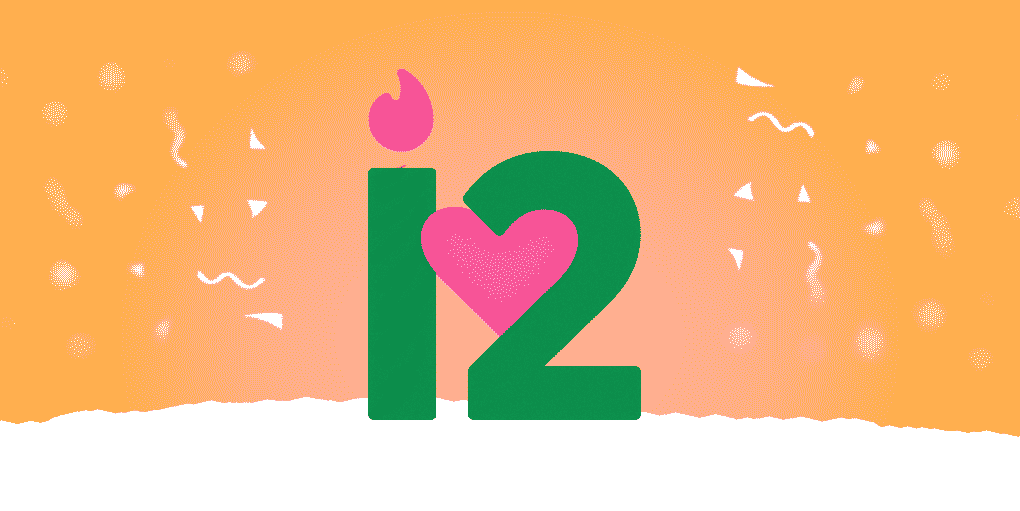
Fuzzy Math hit its 12 year anniversary on April 1, 2021! 🥳 To honor this milestone, we chatted with Fuzzy Math partners and co-founders Mark Baldino and Ben Ihnchak about the company’s growth, changes to the design industry, and what it’s been like to work together over the years.
Check our conversation below!
Fuzzy Math
How do you define success for your company? And has that changed at all over the years?
Mark Baldino
For Fuzzy Math? I don’t think it’s changed. It’s always been a balance of team satisfaction, employee satisfaction, and client satisfaction. I think there’s been times when I’ve leaned more heavily into making the team happier than them and maybe sacrificing some client happiness. And then there’s been the opposite when I’ve leaned into clients and ensure their happiness. And it’s a real delicate balance. But that’s how I view it, how happy and successful we’re making our clients. And I’ll have been successful as the team at Fuzzy Math. Ben?
Ben Ihnchak
Yeah, I think this is a really hard question. It’s not how … my brain does not work like this. I really struggle with this. There’s no immediate jump to the head. What I do think that has remained the exact same from the beginning of Fuzzy Math till now is my interest in getting out of bed and not dreading what I have to do for the rest of the day. And that’s a life goal, possibly my only life goal, and I want that to be true of everybody else. That has stayed true from the beginning of time at Fuzzy Math till now. And I think that is a is, in some ways, I guess, success. If we can do that, which I feel like we’re doing, we’re in pretty good shape.
Mark Baldino
I feel like you’ve been saying that since day one and in like every interview that we’ve had. Every interview.
Ben Ihnchak
I think I’ve probably said that. I would be shocked if I did not say that in an interview. But it’s true. That’s my goal. I’ve been in places I’ve worked where that was not the case, and it’s not fun.
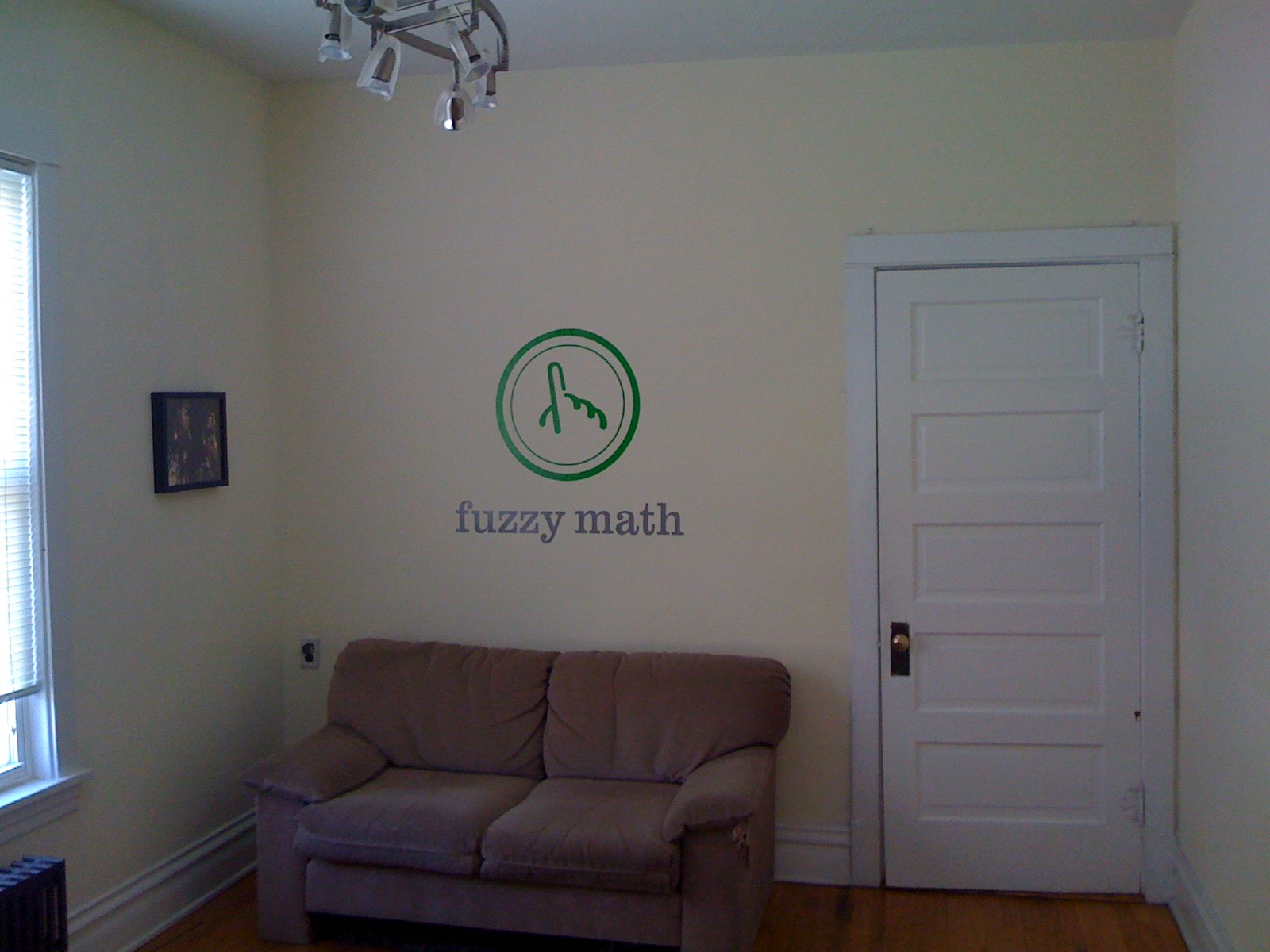
What’s one lesson you’ve learned over the past 12 years of running Fuzzy Math that you would tell someone else who’s just starting their design firm?
Mark Baldino
Stop where you are? I don’t know. Ben, you got a good answer for this one?
Ben Ihnchak
I have one that I know I’ve said before and I’m gonna say it again now that I’m more married to Mark than I am to my own wife. We have so much insurance on each other and all of these legal agreements and we make more decisions together, than I probably make with Kristi, my wife. It’s just two people, which is probably … I don’t think any business school would give advice to do it the way that Fuzzy Math’s done it, but it’s worked out incredibly well. So like, if you’re going into this and you have a partner just, you know, play through some challenges and play through some difficult times of like, how are we going to handle different situations?
Mark Baldino
Yeah, I would have been surprised had that not come up eventually. A quote that I read … Yvon Chouinard is the co-founder of Patagonia and wrote a book that I really enjoyed called Let My People Go Surfing. He said that the sooner a company tries to be what it’s not, the sooner it tries to “have it all” the sooner it’ll die. That sounds really dramatic, but I think it’s kind of been our, you know, marching orders.
At Fuzzy Math, it’s like, we do a lot, but we kind of were in this UX space and we’ve stayed in that lane and we’ve had lots of interest in offering advice to get out of that lane and do other things. We could be a much bigger firm, but we’ve really kind of made a bet on UX. So, I would just encourage people who are starting a company to find out what you think is you’re really really good at and what you want to be maybe known for or what is your advantage over other firms and stay focused on that. Maybe later on if you have enough success you can start to get outside of that lane, but I think people chase shiny objects all the time in business and we’ve come to keep our head down and straight on the UX path. We happen to be fortunate that the UX world has grown up around the company, and so we’re fortunate in that way. But every time I think about doing something a little bit different, I try to go back to what is the core of what makes Fuzzy Math Fuzzy Math and the services we provide?
How did COVID and the difficulties of this past year impact Fuzzy Math as a company? Were there any specific challenges or did you learn anything about yourselves as co-founders kind of getting through 2020?
Mark Baldino
I mean, yeah, I think we all learned a lot about ourselves and perseverance and pushing through it on the human side of it, like the employee side. I think it was just this realization that, whatever we do, whatever we get done, that it’s okay. If things slip timing, we need more time on a project, people need time away from the office, that’s okay. There are way way bigger considerations, given COVID and, I don’t know, general unrest in the world. And so that was the big learning. Let’s give space and time for people and try to be understanding of that and really just keep the business up and running for a year, and we did fine so that’s great.
I’ve been saying to a lot of people that as far as our process and how we work, we really hit the ground running the day we started working remotely. I’ve used this term of sort of the democratization of our process that by everyone being remote, us and our clients, there’s an equality in that digital experience. Everyone wants to be in person, probably, but because everyone’s on equal footing as a box in a Zoom screen, I feel like conversations we have had with clients in the workshops we’ve run have been the same if not more impactful than before, and that would not have been my expectation.
So, if there’s a huge surprise, it’s that we can run this company virtually, and we can work with our clients and service them really, really like an insanely high level of service. And the team can work at an insanely high level of quality, even remotely. And that certainly speaks to the team at Fuzzy Math that we have. Not that I thought we would fail. I just thought we’d have more challenges and all the challenges we’ve had have just been on the personal side of people just getting through the year. The work is amazing and I don’t think ever suffered. And we were able to take into account that people were going to need more time and more space.
If there’s a huge surprise (from this past year), it’s that we can run this company virtually, and we can work with our clients and service them really, really like an insanely high level of service. And the team can work at an insanely high level of quality, even remotely. And that certainly speaks to the team at Fuzzy Math that we have.
Mark Baldino
Ben Ihnchak
I think that captures all the highlights. I didn’t know what to expect from the Friday the 13th, or whatever that date was back in two Marchs ago, and we really didn’t miss a beat. I think that I’m impressed by the staff that everybody was just kind of like, “All right, whatever. Can I grab a monitor from the office?”, and then just kind of hit the ground running the next Monday. It’s legitimately impressive. And then I think we’re actually servicing clients and servicing projects better now and that’s not what I expected.
I think, yeah, just generally impressed, and I think that we’ve made the most of digital. Like digital tools, we haven’t touched a sticky note in a year, little over a year, and that’s kind of surprising to me. Then I think at the same time, just the amount of stuff we can get done in the office is really impressive. So we have all of our client work pretty busy and at the same time we’re also, you know, going through this … I don’t know, massive isn’t the right word, but an incredibly meaningful deep DEI process at the same time that we’re all remote.
We’re going through all the stuff and our real life and work life is all kind of blended together I feel like these days. We’re adding more stuff onto our plates, we’re getting it all done, and I think it’s gonna go really well and it’s gone really well. Again, I’m just generally impressed by the organization top to bottom. What we can get done and how we’ve handled ourselves and how people raise a hand and say, “Hey, I kind of need some time off and just need to get away for a little bit.” I just think that’s how you know real life and work life is blended more than it’s ever been, and we’re doing a really good job of handling that.
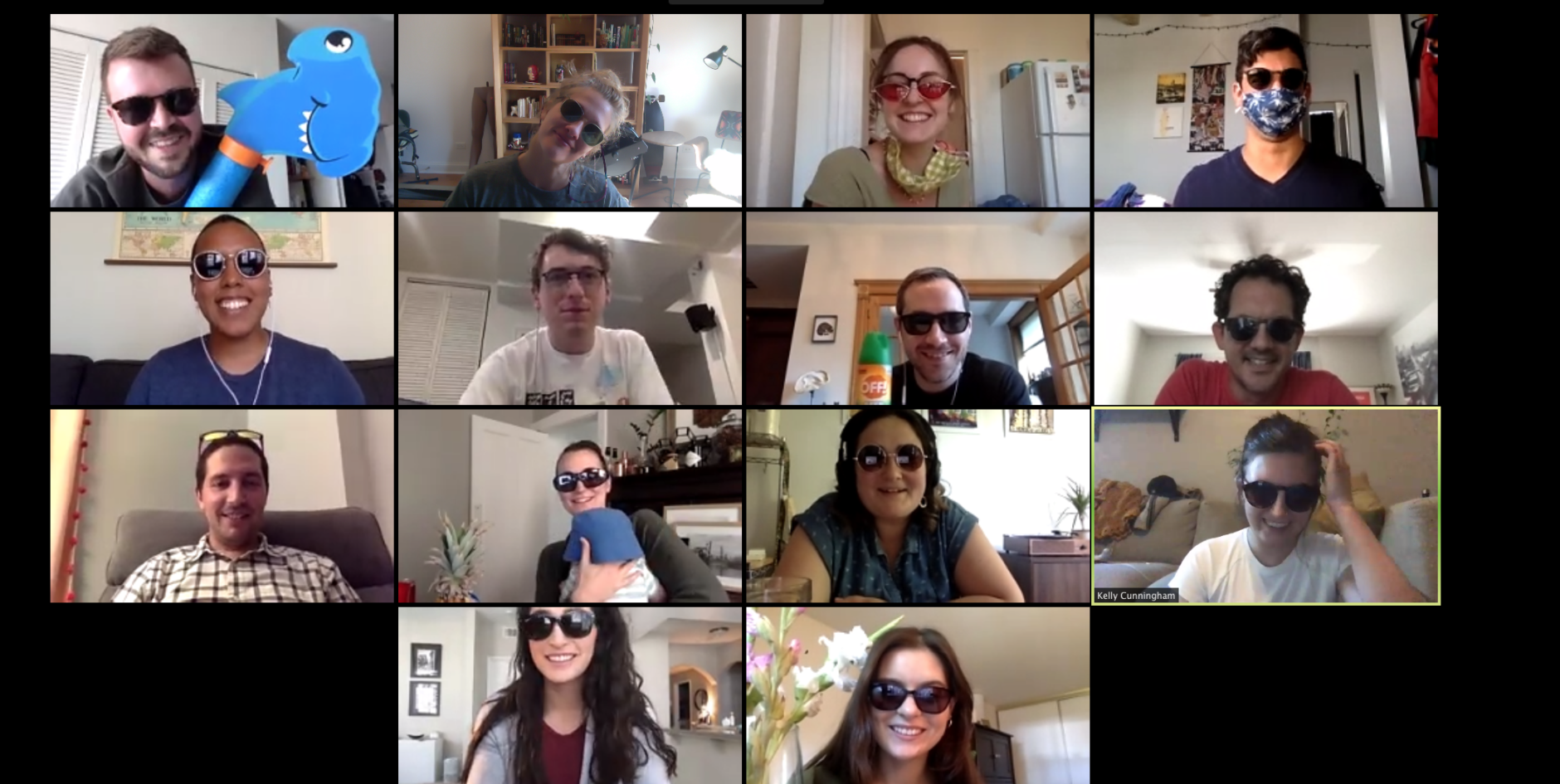
Fuzzy Math is turning 12, which means Fuzzy Math is about to be a teenager. So what’s something radical that you would like to see Fuzzy Math do in the next couple of years?
Ben Ihnchak
Mohawks. Everybody gets a mohawk.
I don’t have any that are necessarily work related. I would like all of us to go to RAGBRAI (a long-distance community bike ride across Iowa). I think that’d be fun. If you want to go, we get an RV and a bike. That seems like a fun week. I think when you’re a teenager, that’s roughly about the time you could probably pull it off.
Maybe extending some services a little bit? Maybe we kind of, you know, we dip our toes into customer experience every once in a while. I think that’s an area that we could explore a little bit deeper, be a little bit more intentional. But yeah, maybe just a more intentional expansion of—not that we’re going to be the full service firm that Mark was just talking about, that’s not where we’re going—but I think maybe there’s some, slight widening of our focus areas that we could do in the coming years.
I think a lot of what Fuzzy Math looks like (in the next few years) is going to be dictated more by the employees and managers and directors.
Mark Baldino
I did have a bad mohawk for a few years that will not be coming back. This was all pre-knowing Ben. I think if I had children, I don’t have children and I’m not going to have kids, but my teenage children would not be radicals. So, the way Ben and I have been slowly growing and nurturing Fuzzy Math, it would be a disservice if all of a sudden things shifted radically — I think the team would be shocked.
I mean, we’re going through this sort of shift right now where we’re introducing a leadership layer into Fuzzy Math. We used to be a very flat organization; it was Ben and I, and then designers. We’ve started to introduce more clarity and new roles in the organization and actually have managers for the first time and directors. For people that are going to be in those roles, that’s a big shift organizationally. It’s not cosmic, but it’s just new and it’s kind of this next generation of what Fuzzy Math is.
So what’s going to change is probably… we’ve always told people that they have control of what we do and how we operate and we are kind of formalizing some of that. I think a lot of what Fuzzy Math looks like is going to be dictated more by the employees and managers and directors. Whereas Ben and I are going to try to focus a little bit more on account growth and sales. Not that we haven’t focused on that stuff, but we’ve done it alongside 50 other things, and now it’s going to be, you know, a top priority for us. And that’s a good thing because then it’s a more organic organization and our personal limitations aren’t going to be keeping the company from growing and delivering services. So, I think that’s that’ll be a shift. I don’t know if it’s going to feel radical (hopefully not), but I think it’s going to be a really positive shift.
Ben Ihnchak
I have a radical one, and I think this is a good segue to this, that by Fuzzy Math 13th year, we might have a somewhat related nonprofit. That is an idea about a year in the making, that we’ve been working on. I don’t think we’ll give the full details in the newsletter, but this is a great opportunity for us to kind of throw the idea out there that a radical shift for our 13th year will be a nonprofit that Fuzzy Math is involved in and is like a sister organization. We don’t know all the details, but I think that’s pretty radical and will be happening in our 13th year.
This is a great opportunity for us to kind of throw the idea out there that a radical shift for our 13th year will be a nonprofit that Fuzzy Math is involved in and is like a sister organization. We don’t know all the details, but I think that’s pretty radical and will be happening in our 13th year.
Ben Ihnchak
Design
Alright, moving into some of the design-related questions. What’s one surprising way the design field has changed since you started Fuzzy Math 12 years ago?
Mark Baldino
I mean, the first thing is that I don’t know if this is surprising, but when we launched Fuzzy Math the term ‘user experience’ was not well understood. User centered design wasn’t well understood. We actually debated on whether we were going to include user experience, and user experience design on the website itself. We did because … it’s what we did. The role I had previous to freelancing was an information architect, that was still the term of the role that was being used in 2006, 2007, 2008.
The biggest shift is like everyone is talking about UX these days, and even things that we don’t consider are UX problems people attribute to UX. So the biggest surprise is just the insane growth in the industry and as a practice and that my parents know what UX is. It’s been easier to describe to family members. My niece wants to have a conversation this summer. She’s in college and she wants to have a conversation about becoming a UX designer. That wouldn’t have happened 12 years ago, so that’s been an exciting change, I think.
[Design is] not just UI stuff, it’s a business idea or change to the business model or a shift in thinking and it’s designers doing that. I think that is way more acceptable now than it was a decade and a half ago and it’s fun.
Ben Ihnchak
Ben Ihnchak
Yeah, maybe not surprising but exciting for me is just seeing design being brought up at the higher levels of large organizations. It’s cool to see that. I was on a client call yesterday and one of the things that we were doing was redesigning a physical letter that goes in the mail. In order to do that, one of the designers was doing some research and found a white paper somewhere from Harvard about the best practices for this type of letter. We brought that to the client and their minds were blown. I think a lot of it is that, one, it was great but at the same time a bunch of designers are bringing research from Harvard and redesigning a letter and I think this idea of proof that designers can help with this kind of stuff. I don’t think people would think of that as design. We’re really changing how their business works and how they’re approaching their potential customers and we’re doing it from a very different point of view than other people have and it’s very welcome.
I think that’s happened a lot in the last 12 years. That we bring, you know … it’s not just UI stuff, it’s a business idea or change to the business model or a shift in thinking and it’s designers doing that. I think that is way more acceptable now than it was a decade and a half ago and it’s fun.
What’s something that you’re, you’re looking forward to seeing this year in the design industry? Or vice versa. What’s something you hope to never see again, in the design industry?
Ben Ihnchak
These are killing me. [shows MacBook dongle] Some of the greatest design of all time, in my opinion, was the magnetic connectors on the old Apple computers, and that you would kick it, and it would fall out and your computer wouldn’t fall to the floor and the connection was amazing. Now, not only is the magnetic connection gone, but we have like dongles within dongles within dongles. So like, the idea of all the things that are part of the same ecosystem actually working together is mind blowing to me. And I would look forward to these going away as best as humanly possible.
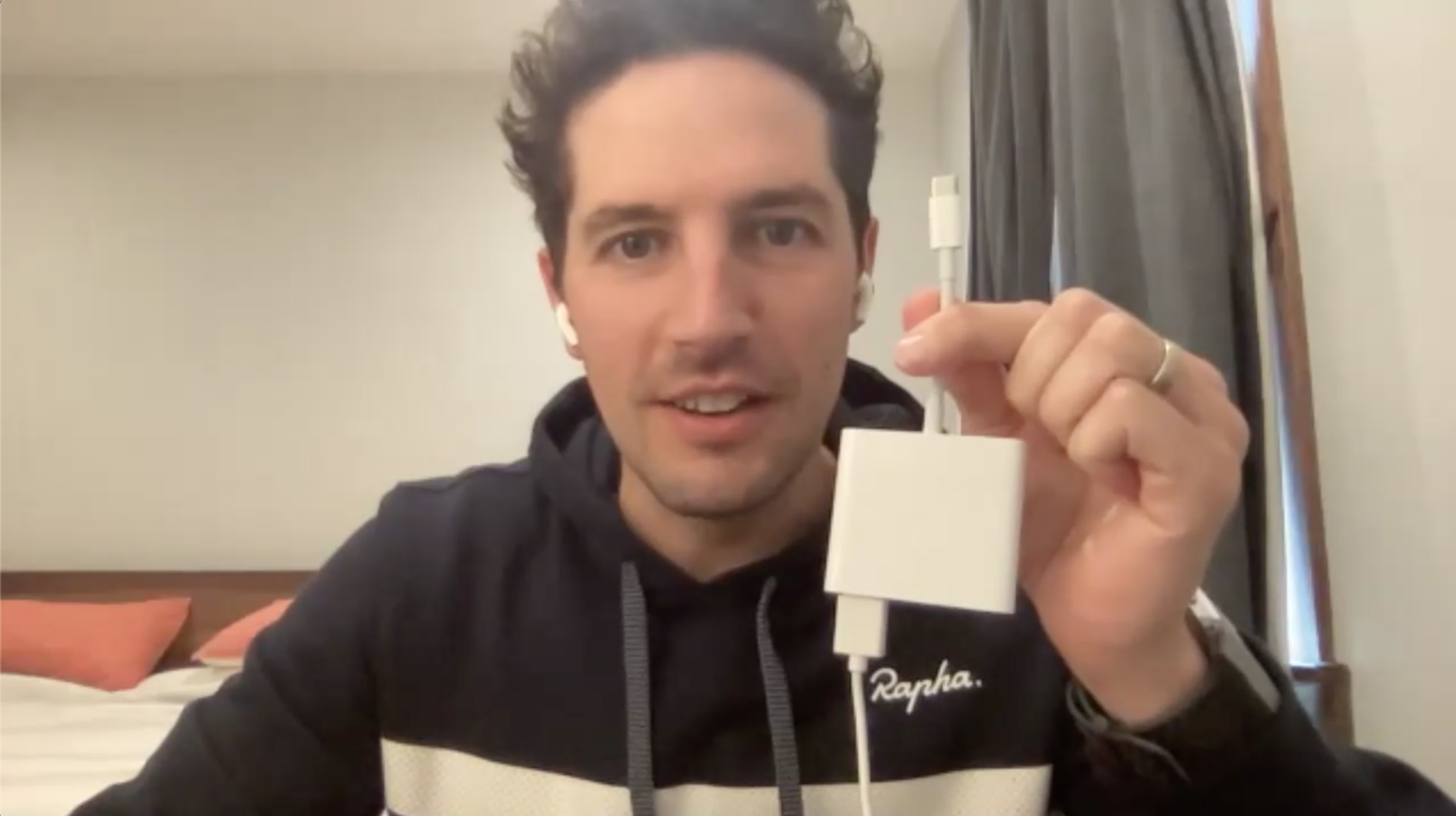
Mark Baldino
Inside Fuzzy Math and in the broader world, there’s been a lot of discussion of diversity, equity, and inclusivity, and design is still trying to figure out its role. My hope is that it does. At Fuzzy Math, and elsewhere, we find our role in DEI and how we can support a more, you know, a set of diverse, equitable, inclusive products and services we designed for our clients and we can advocate for that on clients, we can drive that.
I think there’s a lot of good that we can do in the DEI and accessibility and access world and whether that’s thinking about and including groups that are traditionally excluded from research and processes or as intended targets of products. I mean, it’s a very simple one, but we are getting our feet grounded in that and figuring out how we, as a firm, can contribute to that. I think design as a whole and the design community is interested in contributing in that space, and I think Fuzzy Math can as well.It’s a little unclear to me maybe what it looks like, but I’m excited to see that. There’s some action that’s coming out of it.
Just For Fun
What advice would you give your 12-year-old self?
Mark Baldino
At 12 I’m probably in the basement, making model airplanes or something like that. So I had weird niche interests. I would say, continue to foster those weird niche interests. I think exploration problem solving as a kid is something that I took into adulthood. In truth 12 through 16 were really hard for me. So, it’s not a pat on the back, but keep your head up, you know. It is going to get better. Life is gonna suck at times. This past year, it was pretty awful. No one wants to repeat that.
At the same time, keep your head down and sort of focused and you’ll get through it. I would probably be pretty honest with my 12-year-old self that life is going to be challenging in the early teen years, and, you know, find some good friends and stick by them. I’ve learned over time to really … I’m supported by my family and so I would probably give myself the advice to lean on my siblings more than I did. Because when you’re a kid, you’re always fighting, which is normal, but actually they’re a great support system. I’ll go back and say that. Even though your brother Matt’s kind of a jerk right now he’s actually a really good guy at heart, and, you know, give him a hug every once in a while and don’t chase them with a hammer or something like that.
Ben Ihnchak
Only six more years and then it starts to get better. I think that would be my advice. Post high school, that’s when things started to get good. This is true, still true today, and it would have been nice to know back then. I’ll say this with a smile on my face. Generally, things are terrible, and so when the good stuff comes along, really hold on to it and celebrate it and make sure that those times sink in because those are the special times. When things are happier, when you’re with friends, when you’re just feeling great, try to have those burn into the memory and let all the other stuff slide away. And you know, read more books, Ben.
What’s your favorite fun fact about your co-founder?
Mark Baldino
I mean, I think Ben’s goes back to his teen years. Ben’s choice of fashion and hairstyles in his teen years is definitely the best fun fact. There’s lots of pink hair included of which Ben got, I believe, a suspension because of his hair and a letter he might have wrote. I don’t know there might be more to that story. That side of Ben, I don’t think it’s it’s like a huge surprise to people when they get to know him. But I think when you first meet him you probably would not have thought that he was a punk and like heavy metal, pink haired teenage kid. That’s definitely the funnest fact about Ben.
Ben Ihnchak
I want to say that it is Mark’s breakdancing days, but I don’t know if we’re allowed to lie during this. (Editor’s note: It’s an inside joke at Fuzzy Math that Mark has a secret past as a breakdancer. Does he actually? That’s for you to decide.)
I’m just honestly impressed by Mark’s handiness. It’s shocking to me because I’m not able to be a handy person and I never grew up with anybody that was a handy person. So, when I can ask a question to Mark, which I do in my real life, of like, “How do you install a disposal and a sink?”, and it’s way more complicated but he has all the answers. It’s very, very impressive.
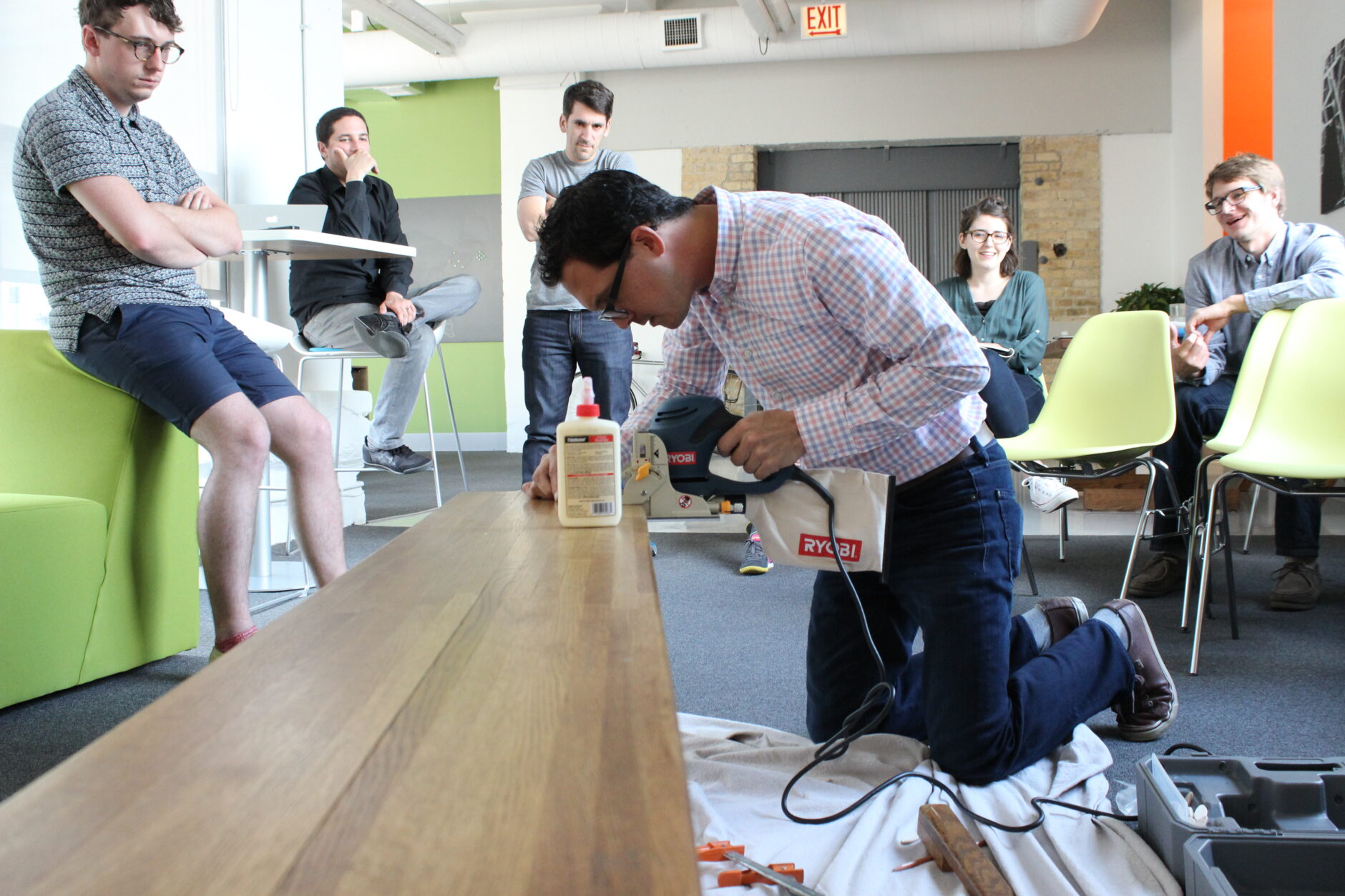
I don’t know, I just think generally how different we are in a lot of ways. I think that works to our advantage. Whenever I tell people that there’s two of us, you know, you get a lot of people who expect to get a lot of one to one votes when there’s two people and it doesn’t happen very often. And then it’s assumed that, we are probably aligned a lot. On the important stuff, absolutely. 100%. But when it comes to just other stuff, we’re really different and I think it’s one of the strengths that we have. That we approach problems in different ways and can communicate through the ones where we’re not exactly aligned.
I think the easiest thing for me to say is Mark and I are very different and that’s my favorite fun fact. And that we do a really good job of pulling in the same direction like 97% of the time.
When you were 12 years old, what did you think you would be doing now? Was any sort of design career even a thought in your brain?
Ben Ihnchak
So, like, seventh grade? Yeah, no.
Mark Baldino
It’s a good question. I thought I wanted to be an architect, and almost pursued that in college. So I’ll say that. That’s kind of design related, right, but not creative. I wasn’t the kid who could paint or really draw, but I thought that engineering architecture was a field I probably would put myself into — not owning a business. That was not … it wasn’t on the list of stuff but happened, somehow, and I’m very happy. That wasn’t in the plan. What about you, Ben?
Ben Ihnchak
Yeah, I think at this point, I don’t know. I highly doubt I had a vision of what I would be doing further than like two weeks beyond where I currently was. I was probably practicing for my bar mitzvah, and getting past that was probably my only goal in life, just being done with it. I think up until probably through my freshman year in high school, being a gardener was the interest of mine but I don’t think that’s actually personal interests. I think that was just based on my dad being a gardener and it just kind of seemed fun. Yeah, I don’t know if you asked me again, when I was 17 … that’s when I got caught up in startups, I would have a very different answer, but at 12 probably nothing.
Well, what would have been your answer at 17?
Ben Ihnchak
That’s when I got hooked on the internet and computers. My mom was a teacher and my dad was the head of the grounds department at the Brookfield Zoo. At 17 there was a .com boom and the idea that you could do something outside of those … this is a whole new world of working on the internet and I just absolutely got hooked on working for myself. I never really loved having a boss. So in five years, let’s ask this question—all these questions—again, and we’ll have something to talk about.
This interview has been edited for clarity and length.